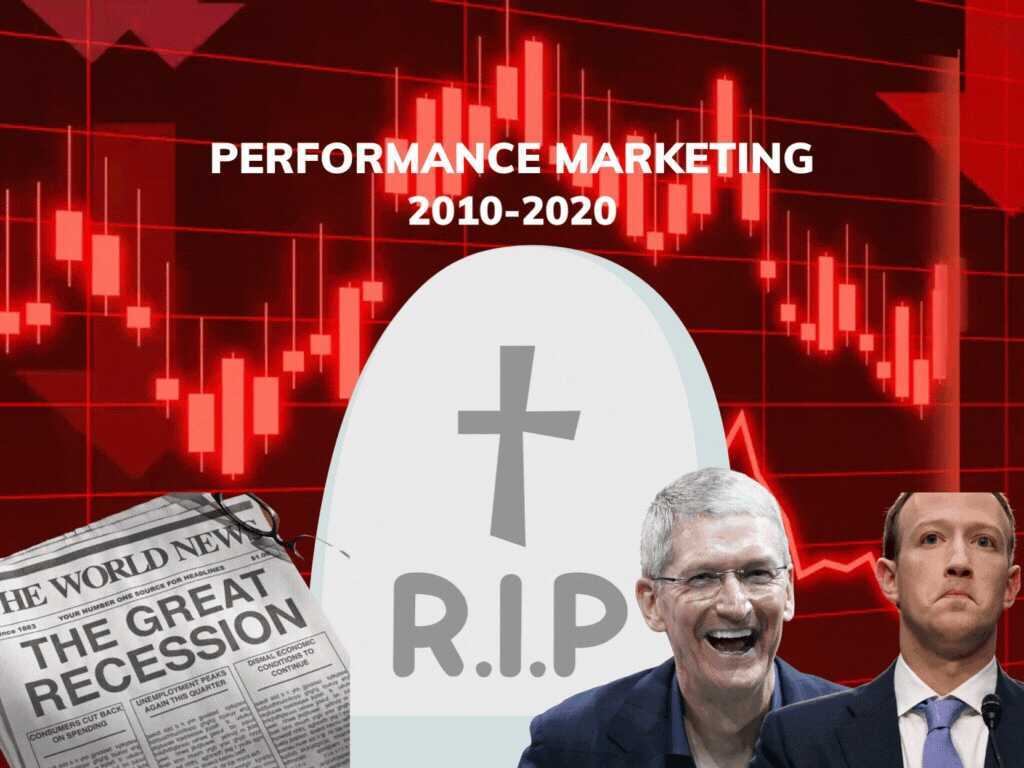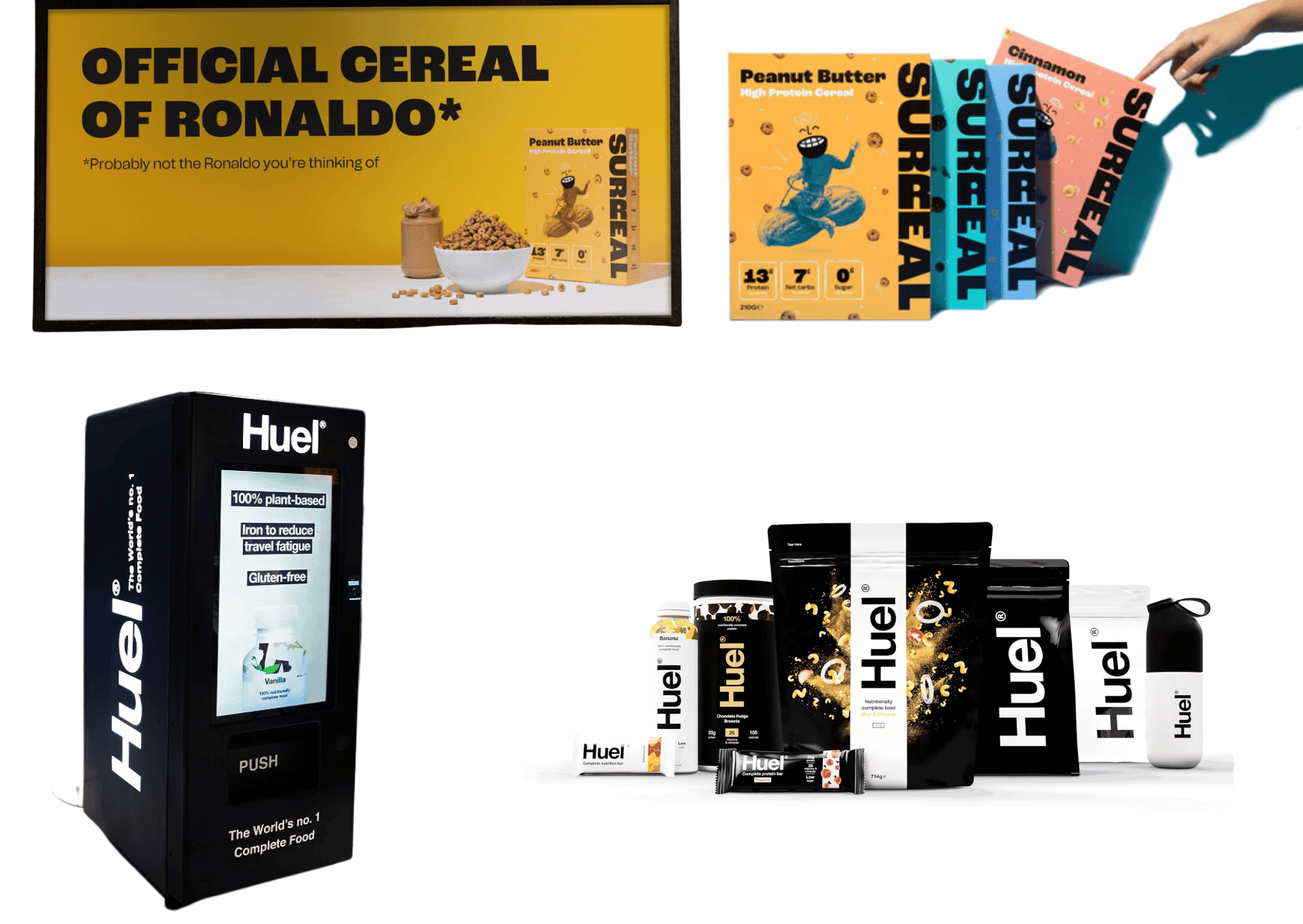Thanks to the new privacy-first web (IOS), rising ad costs and now economic volatility, what was once the powerhouse that took centre stage in marketing, is now leaving brands with a cloud of uncertainty around attribution, higher costs, lower margins, and a struggle to maintain growth and profitability.
It’s no secret the algorithm is not what it used to be in 2010-2020, ROAS is not going back to the highs it used to, and contrary to what you’ve been told, no amount of creative testing or other optimisations is going to get the returns of old that you secretly hope for, but know are near impossible.

Right now brands are finding themselves pumping out more of the same UGC ads, emails, discounts and offers to maintain growth, but this is only fatiguing the customer base and conditioning them to expect discounts which squeezes your margins and diminishes your brand equity (perceived value).
When ROAS was what it was in 2010-2020 it was ok to turn a blind eye to the need of building brand equity for real long-term growth. But now that it isn’t, why continue to do so?
It’s a hamster wheel no brand should be on and a rat race to the bottom… it’s time to get off.
When ROAS was what it was in 2010-2020 it was ok to turn a blind eye to the need of building brand equity for real long-term growth. But now that it isn’t, why continue to do so?
It’s a hamster wheel no brand should be on and a rat race to the bottom… it’s time to get off.
Relying solely on performance marketing is killing your brand. Here are 6 reasons why:
- Short-term focus: Performance marketing emphasises immediate results and often overlooks long-term brand building. This can lead to a shortsighted approach that prioritises quick sales over sustainable growth.
- Customer fatigue: Constant promotions, discounts, and aggressive sales tactics can lead to customer fatigue and erode brand value. Over time, customers may expect deals and be unwilling to pay full price, impacting profitability.
- Lack of differentiation: Performance marketing typically focuses on optimising for clicks, conversions, and sales. This can lead to a generic marketing approach that doesn't differentiate your brand from competitors, making it harder to build customer loyalty and stand out in a crowded market.
- Channel dependency: Relying on performance marketing often means dependence on specific channels like social media ads or search engine marketing. Changes in algorithms, policies, or increasing competition can significantly impact the effectiveness of these channels, leaving your business vulnerable.
- Limited audience engagement: Performance marketing is transactional in nature and may not foster deep connections with your audience. This can limit opportunities for long-term customer relationships, repeat purchases, and word-of-mouth referrals.
- Privacy concerns: With increasing privacy regulations and the shift towards a privacy-first web, targeting and measuring the effectiveness of performance marketing campaigns have become more challenging, affecting the overall results.
As you know marketing trends evolve over time as markets shift, behavior changes and technology evolves. The most successful brands are the ones that are quick to adapt to these changes and the least successful are the ones that stick to their old ways until it’s too late.
Over the last 20 years, we've seen many disciplines sit on the iron throne.
From the Rise of Search Marketing in the 2000s. To Performance Marketing powered by the algorithm in the 2010s. And now Brand Marketing is here to take the lead and play a key role in a hybrid approach of Performance X Brand marketing which will propel the most successful brands of this decade.

So the question is, do you continue to do the same thing expecting a different outcome or do you evolve and innovate as the most successful brands have?
Don’t get left behind. Those who evolve first stand to gain the most, and those who don't, probably won't make it.

So what is Brand Marketing exactly? And no, It’s not “Branding”.
"Branding" is a subset of brand marketing and often refers to the process of defining and documenting brand standards, including visual identity (logo, color palette, marks) and messaging (mission, values, tagline) in the form of comprehensive brand guidelines.
That's not what we're talking about here.
Brand marketing is the foundation of any successful brand’s marketing mix. It involves a deep understanding of customers and culture to guide cross-channel marketing campaigns that enrich customer journeys and that go beyond sales or product promotion campaigns.
So instead of the same old FB UGC ad and email flows of Performance Marketing.
Brand marketing is all about orchestrating unique, resonant campaigns that leave a lasting impression, bolstering brand awareness and equity. Often intertwining both offline and online marketing efforts, and sometimes incorporating strategic partnerships that disrupt the status quo.
Successful brand marketing campaigns set your brand apart from competitors and create a flywheel effect that generates massive free publicity and sales, ultimately making your brand the one everyone's talking about and want.
Brand marketing is the foundation of any successful brand’s marketing mix. It involves a deep understanding of customers and culture to guide cross-channel marketing campaigns that enrich customer journeys and that go beyond sales or product promotion campaigns.
So instead of the same old FB UGC ad and email flows of Performance Marketing.
Brand marketing is all about orchestrating unique, resonant campaigns that leave a lasting impression, bolstering brand awareness and equity. Often intertwining both offline and online marketing efforts, and sometimes incorporating strategic partnerships that disrupt the status quo.
Successful brand marketing campaigns set your brand apart from competitors and create a flywheel effect that generates massive free publicity and sales, ultimately making your brand the one everyone's talking about and want.
And no it doesn't have to be expensive. Yes, it can be measured. All it requires is creativity and the right people to maximise its success.



To be clear, The question isn't about completely disregarding Performance Marketing; it's about reframing our approach to it. Performance Marketing is akin to the sprinter who delivers a quick burst of speed but quickly tires, while Brand Marketing is the marathon runner, consistent, enduring and always pacing forward. It's about finding the right harmony between the two - The Sprinter and The Marathon Runner. The best of both worlds. That's the power of a hybrid approach.
The beauty of a hybrid Brand x Performance Marketing strategy is that it's not an either-or situation. It's a harmonious symphony where each strategy plays its part to make the music that resonates with your audience. It's about driving immediate results and building a lasting brand at the same time.
The Performance aspect will keep the lights on, fulfilling immediate goals and keeping the business sustainable. Simultaneously, the Brand aspect will be silently and consistently building a robust reputation and forming deep connections with your audience. Over time, it's the Brand aspect that will keep you ahead in the long run, insulating you against abrupt changes in the market or shifts in customer behaviour.
Our era demands us to be adaptable, versatile, and resilient. To thrive in the dynamic landscape of today's market, brands must shift from a mono-focused performance approach to a balanced, hybrid strategy. A strategy that not only fuels immediate business goals but also fosters a strong brand foundation for future-proof growth.
The brands that get this right, the ones that marry the immediate drive of Performance Marketing with the long-term vision of Brand Marketing, will be the ones leading the way, shaping the market, and setting the standards for others to follow. The time to make this shift is now. Are you ready to join the vanguard? The next era of successful marketing is here. Don't just watch the tide turn, be the tide.
Remember, a well-balanced marketing approach isn't just about survival, it's about thriving amidst the ebbs and flows of the market. So let's get off the hamster wheel and start paving our own path. The path of sustainable growth, memorable brand experiences, and of true value creation.
The beauty of a hybrid Brand x Performance Marketing strategy is that it's not an either-or situation. It's a harmonious symphony where each strategy plays its part to make the music that resonates with your audience. It's about driving immediate results and building a lasting brand at the same time.
The Performance aspect will keep the lights on, fulfilling immediate goals and keeping the business sustainable. Simultaneously, the Brand aspect will be silently and consistently building a robust reputation and forming deep connections with your audience. Over time, it's the Brand aspect that will keep you ahead in the long run, insulating you against abrupt changes in the market or shifts in customer behaviour.
Our era demands us to be adaptable, versatile, and resilient. To thrive in the dynamic landscape of today's market, brands must shift from a mono-focused performance approach to a balanced, hybrid strategy. A strategy that not only fuels immediate business goals but also fosters a strong brand foundation for future-proof growth.
The brands that get this right, the ones that marry the immediate drive of Performance Marketing with the long-term vision of Brand Marketing, will be the ones leading the way, shaping the market, and setting the standards for others to follow. The time to make this shift is now. Are you ready to join the vanguard? The next era of successful marketing is here. Don't just watch the tide turn, be the tide.
Remember, a well-balanced marketing approach isn't just about survival, it's about thriving amidst the ebbs and flows of the market. So let's get off the hamster wheel and start paving our own path. The path of sustainable growth, memorable brand experiences, and of true value creation.
Ready to break free from the relentless cycle of performance marketing that's eroding your brand's value?
Don't let your brand's success be limited by your marketing team's mono-focused marketing approach. It may be convenient for them, but it is certainly limiting you.
Welcome to the era of Hybrid Performance x Brand Marketing.
Welcome to the era of Hybrid Performance x Brand Marketing.
Schedule a chat with us to discuss how a hybrid approach can help your break free from the performance marketing trap, what the process looks like and answer any questions you may have.

